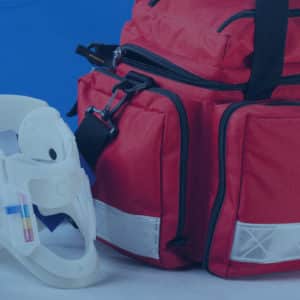Posted by: CTC Training
When it comes to first aid, the three main responsibilities, often referred to as ‘PPP’, are as follows:
- Preserve Life
- Prevent Deterioration
- Promote Recovery
These three principles serve as guiding principles for any certified first aider. Remembering them can save lives.
If you want to be a great first aider, you’ll need to understand these three principles like the back of your hand. In this article, we go through each one in detail.

Preserve Life
The initial priority of a first aider is to ensure survival. If you find yourself at the scene of an accident, your role would be to secure the area for hazards to safeguard your own safety, and then evaluate the patient using the CAB (Circulation, Airway, Breathing) protocol.
This involves checking the patient’s circulation status and taking any necessary action to improve it, verifying the openness of the airway and ensuring that the individual is breathing. At this point, you may need to perform CPR, as well as other first aid procedures like controlling bleeding.
Prevent Deterioration
The second fundamental duty of a first aider is to halt any worsening of the patient’s condition. You would need to arrange the patient in a comfortable position that prevents additional injury, all while maintaining their stable condition before the arrival of medical professionals.
This stage may involve tasks such as monitoring a seizure patient closely, providing sugar to a diabetic in a hypoglycemic state, stopping bleeding or immobilising a broken limb to prevent further damage. It’s also crucial to take preventative measures against infection, such as wearing gloves and sanitising wounds appropriately.
Promote Recovery
Once the immediate threats have been addressed and further harm deterred, your focus as a first aider should shift to encouraging the patient’s recovery. The specifics of this process can vary greatly depending on the situation, but general tactics include offering reassurance to build confidence, ensuring comfort and attempting to alleviate pain.
The Significance of the 3 Ps in First Aid
The concept of the 3 Ps in first aid acts as a guide to ensure a structured, effective response while awaiting professional medical assistance. A first aider’s focus on these three principles can provide the most efficient and beneficial medical intervention possible, from basic patient assessment to urgent procedures such as CPR.
While it’s true that those in the medical profession, such as doctors, nurses and EMTs, should be well-versed in the 3 Ps, this knowledge can be invaluable for anyone. Emergencies can occur anywhere, anytime, and having first aid skills can make a monumental difference.
The Main Goals of First Aid Training
Ultimately, the primary aim of first aid is the preservation of life. The 3 Ps (Preserve Life, Prevent Injury and Promote Recovery) are fundamentally the primary objectives of first aid training. Other extended goals include reducing pain and providing protection to unconscious individuals.
If you’re interested in gaining these crucial skills, CTC Training offers a comprehensive range of first aid courses that will equip you with the necessary knowledge and practical abilities to perform these responsibilities effectively.
Remember, your intervention as a certified first aider can potentially save lives, making this training invaluable. Enrol today with CTC Training.




